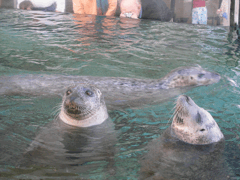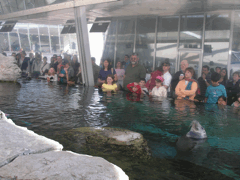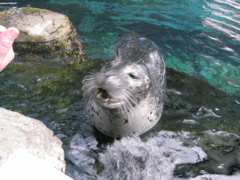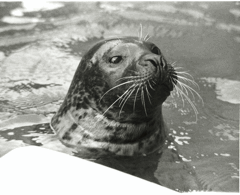A Tale of Two Seals
Air Date: Week of September 25, 2009

Chuck bobs with his less linguistically-talented family.
There once was a famous seal named Hoover who lived in the BostonÂ’s New England Aquarium and spoke English. Now, his grandson Chuck carries that torch, bridging the language barrier between the seal and human world. Living on EarthÂ’s Ike Sriskandarajah goes to the aquarium to talk with the animals.
Transcript
[MUSIC: Louis Armstrong “If We Could Talk To the Animals” from ‘The Great Satchmo Plays His Favorites’ (Vintage Gold Masters - 2006 Reissue)]
YOUNG: Dr. Doolittle could talk to the animals, because he learned their language. But it would be much easier if the animals would just learn to speak ours and some have tried. As Living on EarthÂ’s Ike Sriskandarajah found out at the New England Aquarium.
[TALKING VOICES]
SRISKANDARAJAH: Half a dozen kids press their faces against the tanks at the Aquarium – laughing and pointing at the strange and beautiful procession of octopus and jellyfish and shark. And they’re very impressed when I tell them that among all these exotic creatures there once was one – a seal – that could speak English.

The seal exhibit at the New England Aquarium always draws a crowd. Seal enthusiasts outside the thick glass walls can not hear Chuck's
verbal skills.
KID: Woaah, thatÂ’s so cool!
KID: No it canÂ’t!
KID: It canÂ’t, can it?
KID: ThatÂ’s the coolest thing ever, how does it do that?
KID: Wait are you serious, whatÂ’s his name?
GRAHAM: HooverÂ…
SRISKANDARAJAH: His name was Hoover. ThatÂ’s Cheryl Graham, a lead trainer at the New England Aquarium.
GRAHAM: Hoover was a very famous seal here in Boston. He was on TV, a couple times, and radioÂ… and he was famous for talking.
SRISKANDARAJAH: Yeah, that’s right – this seal could talk. And how he obtained that human skill is a pretty good story.

Chuck calls out in two languages; Seal and English.
[MUSIC]
SRISKANDARAJAH: Before he was loved by all of New England, Hoover was all alone. He was an orphaned pup living on the coast of Maine when he was found.
GRAHAM: I believe the guy probably was a fisherman, his name is George Swallow.
SRISKANDARAJAH: George, coming home one night, saw this hungry seal pup and tossed him a few pieces of bait. They disappeared, so George threw him a few more.
GRAHAM: Part of why he was named Hoover was that he ate huge volumes of fish, much like a Hoover vacuum cleaner. He would just suck all the fish down.
SRISKANDARAJAH: When George was all out of herring, he walked down the beach, with Hoover scooting right behind. As he got to his truck George looked at the helpless pup and he couldnÂ’t just leave him, so he drove Hoover home.
GRAHAM: And they had a little salt pond in their backyardÂ…

Chuck bobs with his less linguistically-talented family.
SRISKANDARAJAH: Where Hoover was very comfortable. George would spend hours back there just hanging out with Hoover and chattingÂ…literally.
GRAHAM: And if you kind of picture yourself in George Swallow’s backyard talking to Hoover, you can see George saying, hello there, Hoover, hey there, Hoover, hey, get out of there, Hoover – hey hey, Hoover.
SRISKANDARAJAH: And they lived happily together. George looked out for Hoover, and Hoover looked up to George – becoming better and better at echoing him right on down to the Maine accent. But George knew he couldn’t keep the seal forever. For one thing, Hoover was eating him out of house and herring.
GRAHAM: George said heÂ’s gonna be too big for me and, you know, itÂ’s not practical. So, George brought him here to the aquarium and said, okay, you guys are going to take good care of him.
[MUSIC]
GRAHAM: By the way, he talks.
SRISKANDARAJAH: HooverÂ’s talent went unrecognized at first. In fact, his handlers thought he had a neurological disorder.

Hoover lived in the New England Aquarium until his death in 1985. His obituary appeared in the Boston Globe.
GRAHAM: So he was just huffing and puffing and he would tip his head back and he would spin in a circle and he would utter these vocalizations. And, at first, the trainers thought that he was having seizures.
[MUSIC]
GRAHAM: Then, they started hearing the word Hoover. [Cheryl impersonating Hoover] Hey, hey, hey Hoover, hello there, get outta here. [Coughing] He had a Maine accent. It always makes me cough [Cough].
SRISKANDARAJAH: And in the aquariumÂ’s archives, thereÂ’s an actual recording of Hoover in action.
MAN: Excuse me, can I sneak in there with my microphone? Thank you.
SRISKANDARAJAH: Back in 1985, a visitor reached his microphone into the seal tank.
HOOVER: Hey, hey, hey, get outta here.
SRISKANDARAJAH: Hoover wasnÂ’t shy, he kept right on talking.
HOOVER: Hey, how are ya? Hey, hey, hey, get over here.
SRISKANDARAJAH: Hoover died shortly after this tape was made. He received an obituary in the Boston Globe – the first and only seal to receive such an honor. They called him the aquarium’s “Ambassador to the World.” Even today, Hoover’s mission lives on…in his grandson.
GRAHAM: We call him Chuck for short, his real name is Chacoda.
SRISKANDARAJAH: Cheryl has been working with HooverÂ’s grandson, honing his vocal talent, for the past 14 years.
GRAHAM: HeÂ’s a very good-looking guy. Yes, heÂ’s a very smart seal.
SRISKANDARAJAH: Chuck glides up to the shore, he looks me right in the eyes and, like a born ambassador, he welcomes me to his land.
GRAHAM: Say whatever you feel like saying.
[CHUCK GROWLS]
GRAHAM: Good.
SRISKANDARAJAH: ItÂ’s obvious I donÂ’t understand, so Chuck and Cheryl try again.
GRAHAM: Listen: Hi.
CHUCK: Hi.
GRAHAM: Good. [laughs] What weÂ’ll ask for is a how are you right now. Listen: How are you?
CHUCK: Hoow hooo hoow arr how are you?
SRISKANDARAJAH: And just in case you didnÂ’t catch thatÂ…
CHUCK: Hoow hooo hoow arr how are you?
SRISKANDARAJAH: I am filled with a feeling you can only get when a seal with saliva and herring guts dripping out of his mouth asks you how youÂ’re doing.
CHUCK: Growl, growl, growl.
GRAHAM: Go ahead, talk. Good.
[WATER SPLASH]
SRISKANDARAJAH: Chuck is not as eloquent as his grandfather, but itÂ’s not for lack of trying. HeÂ’s spent 14 years learning our language. All that effortÂ…it doesnÂ’t quite seem fair.
SRISKANDARAJAH: Have you tried speaking more in seal speak to them?
GRAHAM: Actually, no.
SRISKANDARAJAH: Now, who among us might have the gravelly, guttural pipes to meet Chuck halfway? Who could be our ambassador to the seal world?
[MUSIC: Tom Waits duet with Hoover]
SRISKANDARAJAH: ThatÂ’s Tom Waits, and for Living on Earth, IÂ’m Ike Sriskandarajah.
[MUSIC: Tom Waits “Starving In The Belly Of The Whale” from ‘Blood Money’ (Anti Records - 2002)
Living on Earth wants to hear from you!
Living on Earth
62 Calef Highway, Suite 212
Lee, NH 03861
Telephone: 617-287-4121
E-mail: comments@loe.org
Newsletter [Click here]
Donate to Living on Earth!
Living on Earth is an independent media program and relies entirely on contributions from listeners and institutions supporting public service. Please donate now to preserve an independent environmental voice.
NewsletterLiving on Earth offers a weekly delivery of the show's rundown to your mailbox. Sign up for our newsletter today!
 Sailors For The Sea: Be the change you want to sea.
Sailors For The Sea: Be the change you want to sea.
 The Grantham Foundation for the Protection of the Environment: Committed to protecting and improving the health of the global environment.
The Grantham Foundation for the Protection of the Environment: Committed to protecting and improving the health of the global environment.
 Contribute to Living on Earth and receive, as our gift to you, an archival print of one of Mark Seth Lender's extraordinary wildlife photographs. Follow the link to see Mark's current collection of photographs.
Contribute to Living on Earth and receive, as our gift to you, an archival print of one of Mark Seth Lender's extraordinary wildlife photographs. Follow the link to see Mark's current collection of photographs.
 Buy a signed copy of Mark Seth Lender's book Smeagull the Seagull & support Living on Earth
Buy a signed copy of Mark Seth Lender's book Smeagull the Seagull & support Living on Earth

